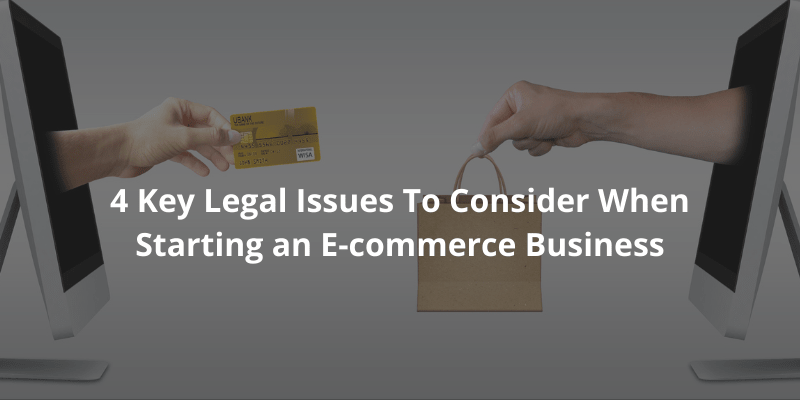Starting an e-Commerce Business: 4 Key Legal Issues to Consider
7 Dec 2023
13 Jul 2021
min read

The e-commerce industry has grown significantly in the past few years – but its growth has been accompanied by an increasingly rigid regulatory environment. Whilst an e-commerce business that sells goods/services online can easily be set up in less than an hour, it is also prone to be done incorrectly. Many online business operators neglect key legal considerations, most notably, the incorporation of legal policies and terms of use page.
If you are thinking of starting an e-commerce business, look no further. Here are the legal issues you must be aware of to ensure that your business properly complies with the law.

Why is it important to be legally compliant as an online business?
It is crucial because the growth in internet and online activity has resulted in an increased number of regulatory issues surrounding the legality of operating a business online. It is easy for business owners to find themselves in trouble by forgetting to consider the legal factors of the business. This leads to legal disputes and extra costs that can easily be avoided with adequate consideration beforehand. To minimise these risks and burdens, it is best to understand what needs to be done to create a secure and legally compliant online store.
Incorporating your business
If you plan to run your business on an online platform such as a website, it is important to first set up your company if you know there will be purchasing or selling involved. If you fail to set up your company, the business activity might be considered outright illegal.
Registering your company is more formally called 'incorporating' your business – which simply means you are registering your business as a limited company. When your business becomes a limited company, this serves as a formal indication that your business is a separate legal entity from you. It also means that your liability as a business owner is limited when compared to a sole trader's, as your assets are protected from personal liability for debts arising from the business. This creates a ‘safety net’ for the business owner by minimising any risks relating to the business.
Every jurisdiction has different requirements and specifications for registering a company. To find out more relevant information, we urge you to check your local governmental resources on the steps to take to incorporate your company.
Terms of use and Legal Policies
Moving onto the content of your website – by including certain key pages on your website, you can limit your liability and better protect your online business from future legal disputes relating to the delivery of your goods or services.
Here are four important legal policies to include on your website:
Terms of Use
Whether or not a website is being used as a business platform, it should include a Terms of Use page, which is also known as Terms and Conditions. These entail rules and restrictions that must be followed by customers visiting your website.
Having a Terms of Use section is important for E-commerce websites because they serve as a ‘contract’ between the visiting customer and business when they are accessing the website. As a business owner, you will be able to assume that the customer has agreed to the terms and conditions listed on your online website.
While having this page is not a legal requirement per se, a significant advantage of having a page for Terms of Use is that it limits your business’ liability. These liability disclaimers will exempt your business from responsibility for damages that your customers suffer after using your products/services. For instance, the terms and conditions may list out all potential damages that the business is not liable for.
By doing so, it can legally protect your e-commerce site from being held liable for liability issues relating but not limited to:
- Warranty
- Product Misrepresentation
- Personal Injury
- Loss of Profits
- Product Malfunctions
- Quality/Safety
This means that if the customer continues to use your site, purchase your products and are aware of the terms of conditions, it will be presumed that they have agreed to the limited liabilities. Limiting your liabilities will therefore protect your e-commerce business and enable you to not spend thousands of dollars on legal fees in the long run.
To find a free Terms of Use Document Template for your website, click here.

Delivery/Shipping Policy
If your e-commerce site delivers goods to customers, you should have a Delivery/Shipping policy. A delivery policy should state all the important information related to the shipping process after an online order is placed. This includes details on delivery methods, delivery times, shipping costs and warranties provided.
By having a delivery/shipping policy, you will have taken precautions for any shipping issues that are likely to occur, especially if there are difficult circumstances such as lost packages and damaged products.
Most e-commerce businesses will also offer international shipping. If they do, their shipping policy will have to break down who bears the responsibility for international taxes, charges and additional fees related to delivering to different countries.
Returns/Refunds Policy
If you offer returns or refunds as a part of your business model, you should have a return or refund policy that details when and under what circumstances customers are eligible. It should also clearly describe the returns process in detail.
Even if you do not offer refunds/returns, you should have a no refund policy to inform your customers that all sales are final. This will help your customer during his decision-making process, before making an order on your website. It also resolves any misunderstandings they might have on returns eligibility.
Copyright Notice
Since your e-commerce site will contain your business logo, content, company-specific designs, and branding materials created by your e-commerce business, you will have to protect this content from being copyrighted by visiting customers and competitors.
You can do this by placing a copyright notice on your website stating that the content is your property, protected by copyright and trademark laws. This will inform customers that the content on your website belongs to you under the law, and, thus, cannot be taken or copied without permission.
The most common thing to be copyrighted is web designs. This is because online stores usually have unique designs that are specifically geared towards their brand and vision. A copyright notice at the footer of the website will help prevent people from stealing their web design.
With the growth of all things digital, it is now extremely easy to copy and distribute content. As such, it is more important than ever to incorporate copyright notices onto your website to protect your content from being stolen and spread.
For more information on the policies and legal templates you need for your e-commerce store, click here.

Data Privacy and Privacy Protection
Whilst accessing e-commerce websites and placing an order online seems simple, you must remember that customer information used to place an order passes through different security channels. As such, consumer privacy and data protection are two areas of major concern.
E-commerce businesses are under a legal obligation to protect consumer privacy and respect their privacy rights. This requires online businesses to regulate the collection and use of consumer personal data.
The standard practice for online businesses is that personal data is collected to fulfil orders, and any other use of their data requires explicit consent.
Therefore, online businesses should always have a privacy policy on their website explaining to the visitor that their data is being collected and used. You will need to state the purpose behind collecting personal data and where that data is transferred. Moreover, you should ensure that the customer is informed regarding whether they are obligated to supply their data to online businesses.
If your website collects cookies, you will need a Cookie Policy to notify customers that their cookies are being collected and to specify what personal data is stored in them. If cookie collection is a requirement to access your online store, that should also be clearly stated.
You can easily create a Cookie Policy using our free template here.
Credit Card Data
If you accept online payment, any personal data collected through the payment process needs to be protected and secured.
As an SME, you are probably less likely to directly collect and process payments yourself. Most SME e-commerce businesses license third-party payment getaways for data collection and payment. As such, E-commerce sites should ensure that they are using reputable payment gateways such as PayPal, such that they are compliant with different local data protection standards.
Trademarks
The scope for copyright issues is wide in e-commerce, and thus, alongside a copyright notice, online businesses should consider registering trademarks for extra protection.
A trademark will protect your business content from being used. This is extremely important for maintaining your brand image and preventing visitors from stealing your content or design. With a trademark, it becomes illegal for anyone to use your trademarked content without authorisation, and the trademark owner can seek damages if necessary.
Online businesses usually trademark distinctive areas of their business to protect their brand, reputation and ultimately gain the maximum commercial benefit from their content.
Content that E-commerce businesses may want to trademark include:
- Pictures, shapes, elements
- Packaging design or shape
- Words, phrases
- Logos
- Domain name
- Unique products
Key Takeaways
- Many E-commerce businesses neglect the legal requirements that running an online business entails. Not being prepared often leads to future legal disputes and large costs.
- Online businesses should always remember to first incorporate their business, as this will offer them more protection against possible legal issues and implications.
- There should be legal policies and terms of use page on your e-commerce site to legally protect your business and your customers. This includes having a privacy policy, cookies policy, disclaimers, and copyright notices.
Please note that this is a general summary of the position under common law and does not constitute legal advice. As the laws of each jurisdiction may be different, you may wish to consult your lawyer.
Keywords:
